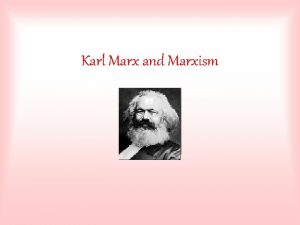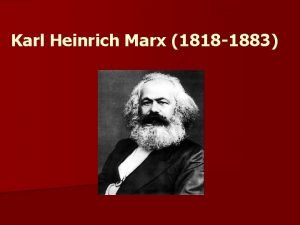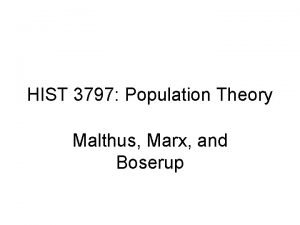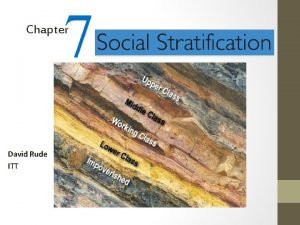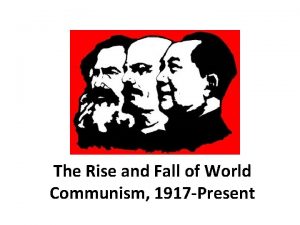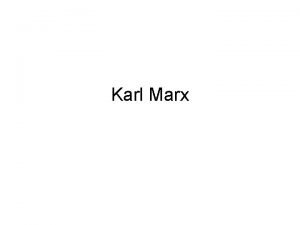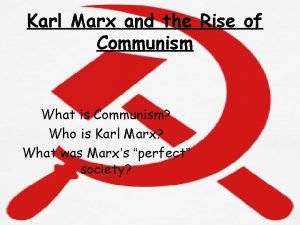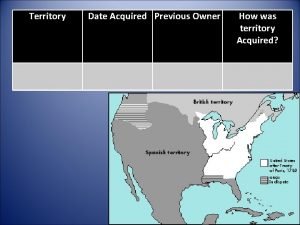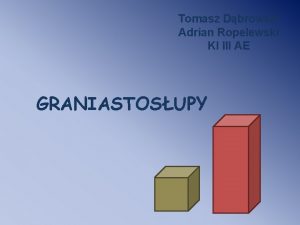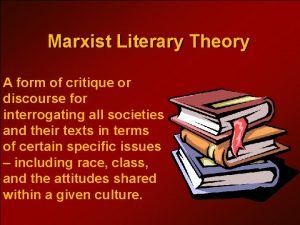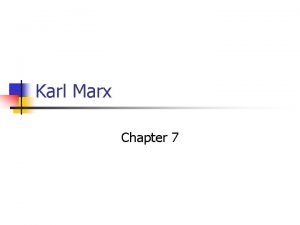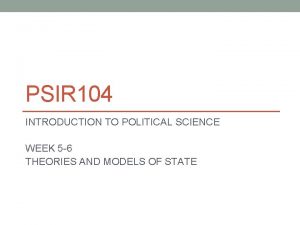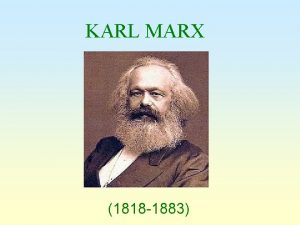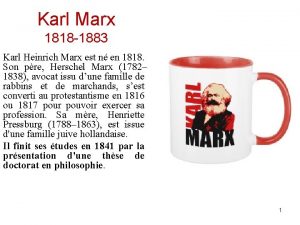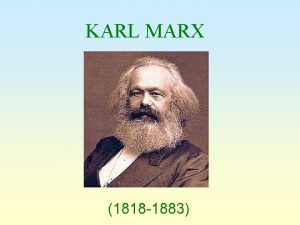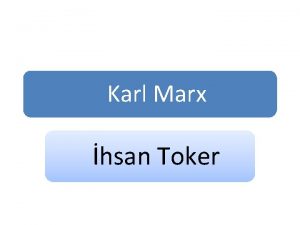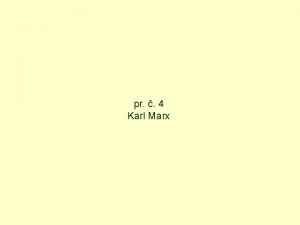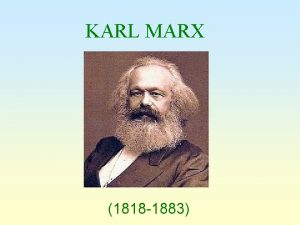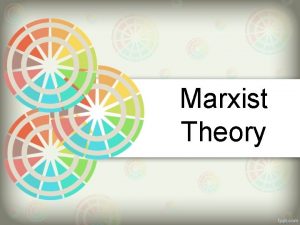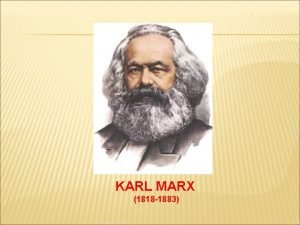MARXIST THEORY Karl Marx 1818 1883 KARL MARX















- Slides: 15

MARXIST THEORY

Karl Marx 1818 -1883

KARL MARX �a German philosopher, economist, sociologist, historian, journalist, and revolutionary socialist �His ideas played a significant role in the development of social science and the socialist movement

�Marx qclass was particularly interested in: struggles q. Means of production q. The commodification of labour and the labourer

Karl marx �Marx's theories about society, economics and politics—collectively known as Marxism—hold that all societies progress through the dialectic of class struggle: a conflict between an ownership class which controls production and a lower class which produces the labour for goods.

MARXISM �Marx theorized that when profits are not reinvested in the workers but in creating more factories, the workers will grow poorer and poorer until reaching a crisis point. A revolt will lead to a restructuring of the system.


The worker becomes all the poorer the more wealth he produces, the more his production increases in power and range. The worker becomes an ever cheaper commodity the more commodities he creates. With the increasing value of the world of things proceeds in direct proportion to the devaluation of the world of men. Labour produces not only commodities; it produces itself and the worker as a commodity -- and does so in the proportion in which it produces commodities generally. --Marx, Economic and Philosophic Manuscripts (1844)

COMMUNISM �FOR A POLITICAL SYSTEM TO BE CONSIDERED COMMUNIST, THE UNDERCLASSES MUST OWN THE MEANS OF PRODUCTION—NOT THE GOVERNMENT NOR THE POLICE FORCE.

Bourgeoisie vs. Proletariat Bourgeoisie � the property owning class � Originally this described “people who lived in the borough”—city dwellers (as opposed to the rural citizens) � A legally defined class of inhabitants having the rights of citizenship and political rights in a city � people with a certain cultural and financial capital belonging to the middle or upper stratum of the middle class; affluent � � � the wealth of the bourgeoisie depended on the work of the proletariat. Therefore, capitalism requires an underclass. Marx predicted that the continued exploitation of this underclass would create great resentment. Eventually the proletariat would lead a revolution against the bourgeoisie. The final struggle would lead to the overthrow of capitalism and its supporters. Proletariat � the industrial working class � the class of wage-earners whose only possession of significant material value is their labour-power (ability to work) � mercilessly exploited bourgeoisie � the work carried out by the proletariat created great wealth for the capitalist. The products created in the factory (the material outcome of the workers' labour) were sold for more than the value of the labour itself (i. e. more than the workers' wages). For instance, the factory worker may get paid £ 2 to produce a yard of cloth. The capitalist then sells the cloth for £ 5. In this way, the capitalist, who controls the process of production, makes a profit. But the worker does not benefit from this added value, and fails to benefit from the fruits of his/her own labour. � Following the proletariats' defeat of capitalism, a new classless society would emerge based on the idea: 'from each according to his abilities, to each according to his needs'. In such a society, land, industry, labour and wealth would be shared between all people. All people would have the right to an education, and class structures would disappear. Harmony would reign, and the state would simply 'wither away'.

Marxist theory CONVINCED THAT WORKERS REMAIN LARGELY UNAWARE OF THEIR OWN OPPRESSION SINCE THEY ARE CONVINCED BY THE STATE TO BE SELFLESS.

MARXIST LITERARY THEORY �In a text, a Marxist theorist looks for: Ø How classes are represented Ø What is the fate of each class Ø Does the text support the status quo? How does it do so, or how does it refute it? Ø CONSIDERS HOW OFTEN THE QUEST FOR WEALTH TRADITIONALLY DEFINES CHARACTERS.

MARXIST CRITICISM SEEKS TO ANSWER �THE FOLLOWING QUESTIONS ABOUT LITERATURE: � 1. WHAT ROLE DOES CLASS PLAY IN THE WORK; WHAT IS THE AUTHOR’S ANALYSIS OF CLASS RELATIONS? � 2. HOW DO CHARACTERS OVERCOME OPPRESSION?

MARXIST CRITICISM QUESTIONS CONTINUED � 3. IN WHAT WAYS DOES THE WORK SERVE AS PROPAGANDA FOR THE STATUS QUO; OR DOES IT TRY TO UNDERMINE IT? � 4. WHAT DOES THE WORK SAY ABOUT OPPRESSION; OR AR SOCIAL CONFLICTS IGNORED OR BLAMED ELESWHERE?

MARXIST CRITICISM QUESTIONS CONTINUED � 5. DOES THE WORK PROPOSE SOME FORM OF UTOPIAN VISION AS A SOLUTION TO THE PROBLEMS ENCOUNTERED IN THE WORK?
 Jenny von westphalen
Jenny von westphalen 1883-1818
1883-1818 Karl marx population theory
Karl marx population theory Karl marx conflict theory
Karl marx conflict theory Karl marx communism
Karl marx communism Herbert spencer introduction
Herbert spencer introduction Karl marx
Karl marx Karl marx theory of capitalism
Karl marx theory of capitalism Convection of 1818
Convection of 1818 Previous owner of spanish cession
Previous owner of spanish cession Podstawą graniastosłupa o 1818 krawędziach jest
Podstawą graniastosłupa o 1818 krawędziach jest Virtudes teologales
Virtudes teologales Marxist literary theory definition
Marxist literary theory definition Marxist theory of unemployment
Marxist theory of unemployment Little red riding hood marxist theory
Little red riding hood marxist theory Neomarxism
Neomarxism
